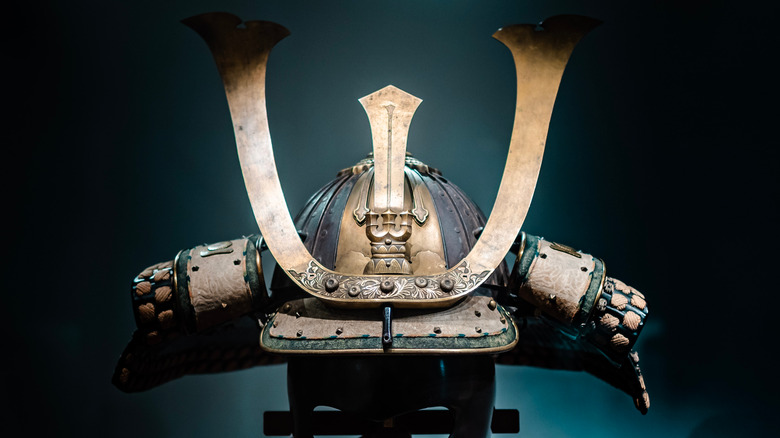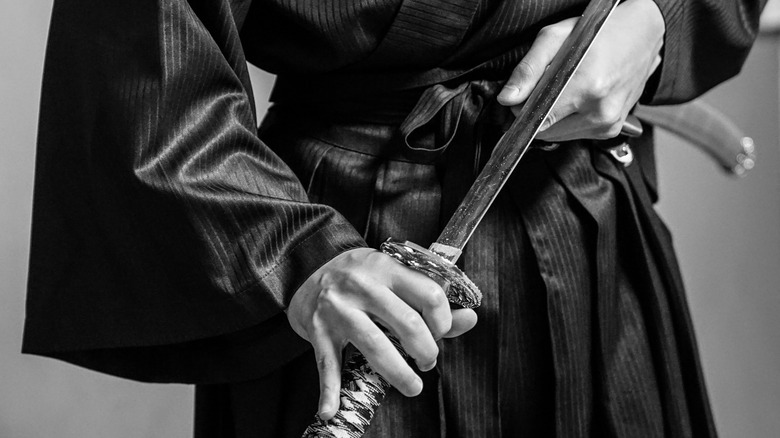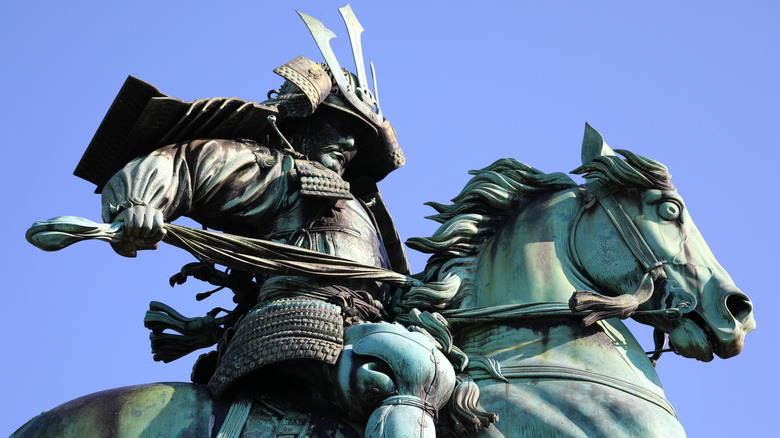This Lethal Law Gave Samurai The Right To Murder
Without a doubt, samurai are some the most widely recognized and romanticized figures from Japanese history, similar in nigh-mythical stature to sword-and-board knights from medieval Europe. So naturally, this means that they're just as often misunderstood and mischaracterized. Loads of anime and films — hyper-stylized, bloody, designed for drama — have left folks in both the West and East with heads full of power fantasies about badass dudes with swords sort of hacking and howling their way through life. Reality is a bit more sobering.
For instance, samurai never trolled around wearing their armor, just like knights – armor was reserved for army vs. army battle. They were mercenaries, as well, concerned about equity and family reputation rather than "honor" as any kind of noble virtue. This means wealthy people hired them, which bred an aristocratic class of educated fighter guys who also sometimes wrote poetry. Not to completely downplay the myth, but if we're going to talk about a "law" that allowed samurai to kill common, non-military citizens, it's important to remember how structured and hierarchical medieval Japan was. This is particularly true during the Edo era (1603-1868) under the Tokugawa shogunate, which unified Japan and almost completely closed its borders starting in 1639 (as explained on Japan Guide). This is when the samurai class flourished.
And the law allowing samurai to kill — "kirisute-gomen" — also followed a very procedural, even ritualized format that samurai needed to obey.
Codes of conduct surrounding reputation and slander
"Kirisute-gomen" basically translates as "sorry for cutting," or more conversationally, "sorry, but I'm going to cut you" (lots of variations on translations). And it wasn't a single "law," so to speak, in the way we might imagine "pursuant to Article 5, paragraph VII of blah blah ordinance." It was a highly prescribed, rule-bound right that everyone in society was more or less aware of. It's most analogous to codes of conduct regarding duels, or even self-defense with a handgun. And for samurai, offenses to reputation were as harmful as attacks to one's body.
As Samurai World summarizes, the right of kirisute-gomen could be invoked in cases of extreme disrespect, slander, defamation of character, that sort of thing. It could be invoked by a samurai against a commoner, as an attack, and also by samurai against their superiors, in defense (which is honestly a pretty decent way to try to curb abuses of power). However, in the case of samurai protecting themselves against superiors, they could only use their wakizashi short sword, rather than their longer, main katana. This itself was a way to ensure that the lower-ranked samurai was worthy of esteem: he bested a superior with a less advantageous weapon, and it was fitting that the higher-ranked samurai be dispatched for being unsuited to his position.
Most pointedly: a samurai had to complete a kill in a single strike. Follow-ups or sneak attacks weren't allowed.
Severe consequences for wrongful deaths
As Samurai World continues, there were serious consequences for invoking the right of kirisute-gomen. First off, the incident had to be reported to government officials immediately. The samurai who committed the murder was detained for 20 days, and witnesses were called in to corroborate events. The samurai's sword could even be confiscated, which is a huge deal for people who considered their weapons to be "an extension of their soul," as Hiconsumption puts it.
If it was found that a samurai had killed unjustly, dismissal from service was the least that awaited him. His family could be kicked out of their home, and have all of their possessions and property repossessed. Remember than in medieval Japan, the basic unit of society was the family or clan, not the individual. Whatever happened to one happened to all. This could lead to the samurai to commit ritual suicide — seppuku — to regain some semblance of family honor. The absolute worst-case scenario? The offender wouldn't have been allowed to kill himself, per Japanese Wiki Corpus.
These kinds of precepts ensured that guys with deadly weapons couldn't just walk around willy-nilly killing folks who accidentally bumped into them passing through a door or something. They also ensured that jerks in the public couldn't provoke samurai in the hopes of bringing down someone more powerful than they were. This is one reason why public events and gatherings always necessitated swords being deposited at the door before entering.


